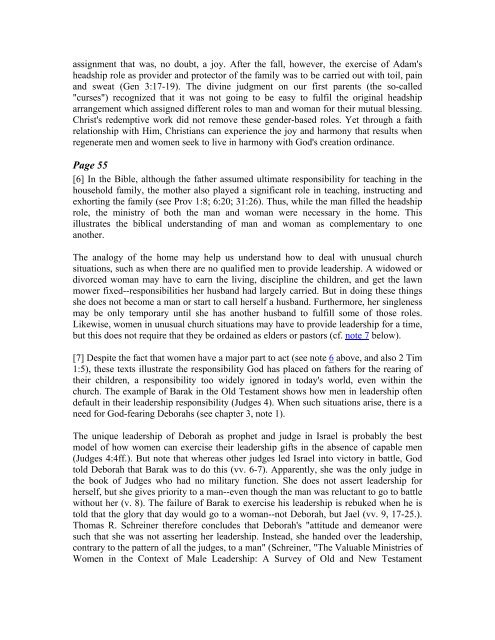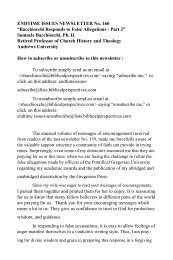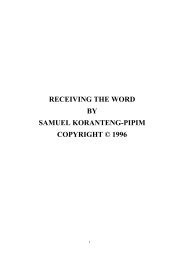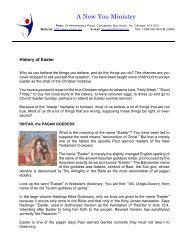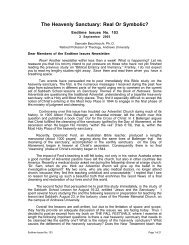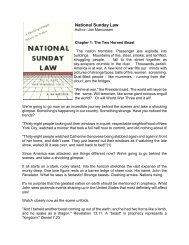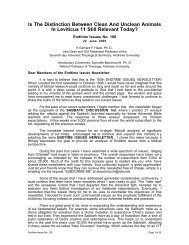Searching the Scriptures - Samuel Pipim
Searching the Scriptures - Samuel Pipim
Searching the Scriptures - Samuel Pipim
- No tags were found...
You also want an ePaper? Increase the reach of your titles
YUMPU automatically turns print PDFs into web optimized ePapers that Google loves.
assignment that was, no doubt, a joy. After <strong>the</strong> fall, however, <strong>the</strong> exercise of Adam'sheadship role as provider and protector of <strong>the</strong> family was to be carried out with toil, painand sweat (Gen 3:17-19). The divine judgment on our first parents (<strong>the</strong> so-called"curses") recognized that it was not going to be easy to fulfil <strong>the</strong> original headshiparrangement which assigned different roles to man and woman for <strong>the</strong>ir mutual blessing.Christ's redemptive work did not remove <strong>the</strong>se gender-based roles. Yet through a faithrelationship with Him, Christians can experience <strong>the</strong> joy and harmony that results whenregenerate men and women seek to live in harmony with God's creation ordinance.Page 55[6] In <strong>the</strong> Bible, although <strong>the</strong> fa<strong>the</strong>r assumed ultimate responsibility for teaching in <strong>the</strong>household family, <strong>the</strong> mo<strong>the</strong>r also played a significant role in teaching, instructing andexhorting <strong>the</strong> family (see Prov 1:8; 6:20; 31:26). Thus, while <strong>the</strong> man filled <strong>the</strong> headshiprole, <strong>the</strong> ministry of both <strong>the</strong> man and woman were necessary in <strong>the</strong> home. Thisillustrates <strong>the</strong> biblical understanding of man and woman as complementary to oneano<strong>the</strong>r.The analogy of <strong>the</strong> home may help us understand how to deal with unusual churchsituations, such as when <strong>the</strong>re are no qualified men to provide leadership. A widowed ordivorced woman may have to earn <strong>the</strong> living, discipline <strong>the</strong> children, and get <strong>the</strong> lawnmower fixed--responsibilities her husband had largely carried. But in doing <strong>the</strong>se thingsshe does not become a man or start to call herself a husband. Fur<strong>the</strong>rmore, her singlenessmay be only temporary until she has ano<strong>the</strong>r husband to fulfill some of those roles.Likewise, women in unusual church situations may have to provide leadership for a time,but this does not require that <strong>the</strong>y be ordained as elders or pastors (cf. note 7 below).[7] Despite <strong>the</strong> fact that women have a major part to act (see note 6 above, and also 2 Tim1:5), <strong>the</strong>se texts illustrate <strong>the</strong> responsibility God has placed on fa<strong>the</strong>rs for <strong>the</strong> rearing of<strong>the</strong>ir children, a responsibility too widely ignored in today's world, even within <strong>the</strong>church. The example of Barak in <strong>the</strong> Old Testament shows how men in leadership oftendefault in <strong>the</strong>ir leadership responsibility (Judges 4). When such situations arise, <strong>the</strong>re is aneed for God-fearing Deborahs (see chapter 3, note 1).The unique leadership of Deborah as prophet and judge in Israel is probably <strong>the</strong> bestmodel of how women can exercise <strong>the</strong>ir leadership gifts in <strong>the</strong> absence of capable men(Judges 4:4ff.). But note that whereas o<strong>the</strong>r judges led Israel into victory in battle, Godtold Deborah that Barak was to do this (vv. 6-7). Apparently, she was <strong>the</strong> only judge in<strong>the</strong> book of Judges who had no military function. She does not assert leadership forherself, but she gives priority to a man--even though <strong>the</strong> man was reluctant to go to battlewithout her (v. 8). The failure of Barak to exercise his leadership is rebuked when he istold that <strong>the</strong> glory that day would go to a woman--not Deborah, but Jael (vv. 9, 17-25.).Thomas R. Schreiner <strong>the</strong>refore concludes that Deborah's "attitude and demeanor weresuch that she was not asserting her leadership. Instead, she handed over <strong>the</strong> leadership,contrary to <strong>the</strong> pattern of all <strong>the</strong> judges, to a man" (Schreiner, "The Valuable Ministries ofWomen in <strong>the</strong> Context of Male Leadership: A Survey of Old and New Testament


